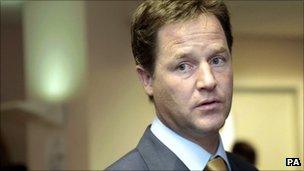Deputy PM Nick Clegg defends UK human rights laws
- Published
- comments

Nick Clegg admits there are problems with how human rights laws are interpreted
Deputy Prime Minister Nick Clegg has defended the UK's human rights laws, saying they have done much to protect the vulnerable and the powerless.
Writing in the Guardian, external, he said governments had "belittled" and "trashed" such laws in recent years.
However, Mr Clegg said the Human Rights Act was often manipulated and called for a "sensible discussion" about how it should be interpreted in future.
The Conservatives want to scrap the act and replace it with a Bill of Rights.
However, in his article, Mr Clegg rejected repealing the act and said the Liberal Democrat position was that any potential Bill of Rights would bolster current laws and "protect other British liberties, such as the right to jury trial."
Last week Prime Minister David Cameron pledged to "get a grip" on cases where the current laws were used inappropriately.
The prime minister said that people should "understand the real scope of these rights and not use them as a cover for rules or excuses that fly in the face of common sense".
Agreeing with Mr Cameron, the Lib Dem leader said the "biggest problem" was that the Human Right Act is sometimes "manipulated not just by the media but by over-cautious officials" who use it to justify their decisions.
"It was, for example, of no help to anyone when police spokespeople blamed human rights for a decision to deliver a KFC meal to a fugitive on a roof," said Mr Clegg.
Responsibilities 'myth'
But, despite this, the deputy PM argues that human rights legislation in the UK has done much good and should be protected.
"[It has] been instrumental in preventing local authorities from snooping on law-abiding families, in removing innocent people from the national DNA database, in preventing rapists from cross-examining their victims in court, in defending the rights of parents to have a say in the medical treatment of their children."
Mr Clegg also rejected as a "myth" the view that people should lose human rights protection in some cases.
"[It] panders to a view that no rights, not even the most basic, come without responsibilities", he said, and that "criminals ought to forfeit their very humanity the moment they step out of line."
The European Convention on Human Rights protections - such as the right to a private and family life and freedom of expression - became directly enforceable in UK courts in 2000 via the Human Rights Act.
In his article, Mr Clegg also said the UK would seek to reform the European Court of Human Rights when it takes over chairmanship of the Council of Europe in November - in order to improve the speed and consistency of the court's decisions.
Campaigners have welcomed Mr Clegg's words.
Liberty director Shami Chakrabarti said: "This is a welcome intervention from the deputy prime minister and certainly not before time.
"The coalition was stitched together on a civil liberties ticket. You can't talk human rights in the Arab spring whilst trashing them at home all year round."
- Published7 February 2011
- Published2 November 2010